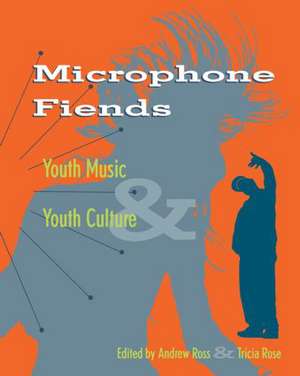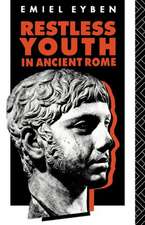Microphone Fiends: Youth Music and Youth Culture
Editat de Tricia Rose, Andrew Rossen Limba Engleză Paperback – 14 apr 1994
Preț: 359.46 lei
Nou
Puncte Express: 539
Preț estimativ în valută:
68.78€ • 74.95$ • 57.96£
68.78€ • 74.95$ • 57.96£
Carte tipărită la comandă
Livrare economică 23 aprilie-07 mai
Preluare comenzi: 021 569.72.76
Specificații
ISBN-13: 9780415909082
ISBN-10: 0415909082
Pagini: 286
Ilustrații: black & white illustrations
Dimensiuni: 187 x 235 x 23 mm
Greutate: 0.53 kg
Ediția:New.
Editura: Taylor & Francis
Colecția Routledge
Locul publicării:Oxford, United Kingdom
ISBN-10: 0415909082
Pagini: 286
Ilustrații: black & white illustrations
Dimensiuni: 187 x 235 x 23 mm
Greutate: 0.53 kg
Ediția:New.
Editura: Taylor & Francis
Colecția Routledge
Locul publicării:Oxford, United Kingdom
Notă biografică
Tricia Rose is Assistant Professor of History and Africana Studies at New York University. Andrew Ross is Director of the American Studies Program and Professor of Comparative Literature at New York University.
Recenzii
"...[This book] is the screaming child demanding attention not only from scholars but from mainstream music journalists as well. The strength of this collection, which is primarily cultural criticism, lies in its various and often conflicting approaches and perspectives." -- American Music, Fall 1996
"...everyone who contributes is bright, excited, and big with fruitful thoughts." -- Puncture
"A huge, multilayered cacphonus conversation, involving styles of popular music ranging from hardcore rap to college rock to rave to Brazilian funk, represented by participants from all avenues of musical culture. The radical decision to include artists and members of the popular press alongside academics means that the voices included within Microphone Fiends don't conform to one language, they argue with each other and with themselves, unafraid of the rebel stance that has characterized youth culture from its rowdy, world-changing birth. Listening to each other, artists, culture workers, and scholars can uncover insights about the pop-cult ground they cultuivate that otherwise would have eluded them." -- Ann Powers, The Village Voice
"Expression is what youth music and youth culture are all about, a mode of expression that has been lacking in a social perspective. The diversity of the book reflects the "multiculturalism" within, giving a precise sub-cultural analysis. The book's dedication to youth musical culture only makes Microphone Fiends better. Fortunately, it has matured to a point where it can report on itself competently. Microphone Fiends definitely represents the music behind its cultures."
"I bet Microphone Fiends becomes required reading in musical history classes everywhere. This exhaustive dissertation of popular (and not so popular) music forms is basically a collection of articles, commentaries and discussions on everything from raves to riot grrls." -- Thrust,#23
". . .strike[s] a welcome balance between self-aware and self-concious pronouncements on the next generation." -- Publisher's Weekly
"...[This book] is the screaming child demanding attention not only from scholars but from mainstream music journalists as well. The strength of this collection, which is primarily cultural criticism, lies in its various and often conflicting approaches and perspectives." -- American Music, Fall 1996
"...everyone who contributes is bright, excited, and big with fruitful thoughts." -- Puncture
"A huge, multilayered cacphonus conversation, involving styles of popular music ranging from hardcore rap to college rock to rave to Brazilian funk, represented by participants from all avenues of musical culture. The radical decision to include artists and members of the popular press alongside academics means that the voices included within Microphone Fiends don't conform to one language, they argue with each other and with themselves, unafraid of the rebel stance that has characterized youth culture from its rowdy, world-changing birth. Listening to each other, artists, culture workers, and scholars can uncover insights about the pop-cult ground they cultuivate that otherwise would have eluded them." -- Ann Powers, The Village Voice
"Expression is what youth music and youth culture are all about, a mode of expression that has been lacking in a social perspective. The diversity of the book reflects the "multiculturalism" within, giving a precise sub-cultural analysis. The book's dedication to youth musical culture only makes Microphone Fiends better. Fortunately, it has matured to a point where it can report on itself competently. Microphone Fiends definitely represents the music behind its cultures."
"I bet Microphone Fiends becomes required reading in musical history classes everywhere. This exhaustive dissertation of popular (and not so popular) music forms is basically a collection of articles, commentaries and discussions on everything from raves to riot grrls." -- Thrust,#23
". . .strike[s] a welcome balance between self-aware and self-concious pronouncements on the next generation." -- Publisher's Weekly
"...[This book] is the screaming child demanding attention not only from scholars but from mainstream music journalists as well. The strength of this collection, which is primarily cultural criticism, lies in its various and often conflicting approaches and perspectives." -- American Music, Fall 1996
Cuprins
Introduction, Andrew Ross; Part 1 Histories & Futures; Chapter 1 We Know What Time It Is, George Lipsitz; Chapter 2 Same As It Ever Was, Susan McClary; Chapter 3 Is Anybody Listening? Does Anybody Care?, Lawrence Grossberg; Chapter 4 Excerpt from Altered Spade: Readings in Race-Mutation Theory, Greg Tate; Part 2 Locating Hip Hop; Chapter 5 A Style Nobody Can Deal With, Tricia Rose; Chapter 6 Puerto Rican And Proud, Boyee!, Juan Flores; Chapter 7 The State of Rap, Jeffrey Louis Decker; Chapter 8 Contracting Rap, Tricia Rose; Part 3 The Dance Continuum; Chapter 9 In the Empire of the Beat, Walter Hughes; Chapter 10 Hello, Lady Kier Kirby; Chapter 11 Not a Mutant Turtle, Willi Ninja; Chapter 12 Nobody Wants a Part -Time Mother, Tricia Rose; Chapter 13 Moral Panic, the Media and British Rave Culture, Sarah Thornton; Chapter 14 The Funkification of Rio, George Yúdice, Hermano ViannaJr.; Part 4 Rock, Rituals & Rights; Chapter 15 Rah, Rah, Sis-Boom-Bah, Robert Christgau; Chapter 16 Border Crossing in the U.S.A., Donna Gaines; Chapter 17 Highbrow, Lowbrow, Voodoo Aesthetics, Robert Walser; Chapter 18 Smells Like Teen Spirit, Joanne Gottlieb, Gayle Wald;















